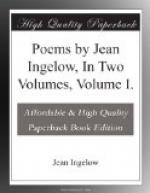“’Nor any diver reach to raise
My jewel from the blue abyss;
Or could they, still I should but praise
Their
work amiss.
“’Thrown, thrown away! But I love
yet
The fair, fair hand which did the deed:
That wayward sweetness to forget
Were
bitter meed.
“’No, let it lie, and let the wave
Roll over it for evermore;
Whelmed where the sailor hath his grave—
The
sea her store.
“’My heart, my sometime happy heart!
And O for once let me complain,
I must forego life’s better part—
Man’s
dearer gain.
“’I worked afar that I might rear
A peaceful home on English soil;
I labored for the gold and gear—
I
loved my toil.
“’Forever in my spirit spake
The natural whisper, “Well ’twill
be
When loving wife and children break
Their
bread with thee!”
“’The gathered gold is turned to dross,
The wife hath faded into air,
My heart is thrown away, my loss
I
cannot spare.
“’Not spare unsated thought her food—
No, not one rustle of the fold,
Nor scent of eastern sandal-wood,
Nor
gleam of gold;
“’Nor quaint devices of the shawl,
Far less the drooping lashes meek;
The gracious figure, lithe and tall,
The
dimpled cheek;
“’And all the wonders of her eyes,
And sweet caprices of her air,
Albeit, indignant reason cries,
Fool!
have a care.
“’Fool! join not madness to mistake;
Thou knowest she loved thee not a whit;
Only that she thy heart might break—
She
wanted it,
“’Only the conquered thing to chain
So fast that none might set it free,
Nor other woman there might reign
And
comfort thee.
“’Robbed, robbed of life’s illusions
sweet;
Love dead outside her closed door,
And passion fainting at her feet
To
wake no more;
“’What canst thou give that unknown bride
Whom thou didst work for in the waste,
Ere fated love was born, and cried—
Was
dead, ungraced?
“’No more but this, the partial care,
The natural kindness for its own,
The trust that waxeth unaware,
As
worth is known:
“’Observance, and complacent thought
Indulgent, and the honor due
That many another man has brought
Who
brought love too.
“‘Nay, then, forbid it Heaven!’
he said,
’The saintly vision fades from me;
O bands and chains! I cannot wed—
I
am not free.’”
With that he raised his face to view;
“What think you,” asking,
“of my tale?
And was he right to let the dew
Of
morn exhale,
“And burdened in the noontide sun,
The grateful shade of home forego—
Could he be right—I ask as one
Who
fain would know?”




